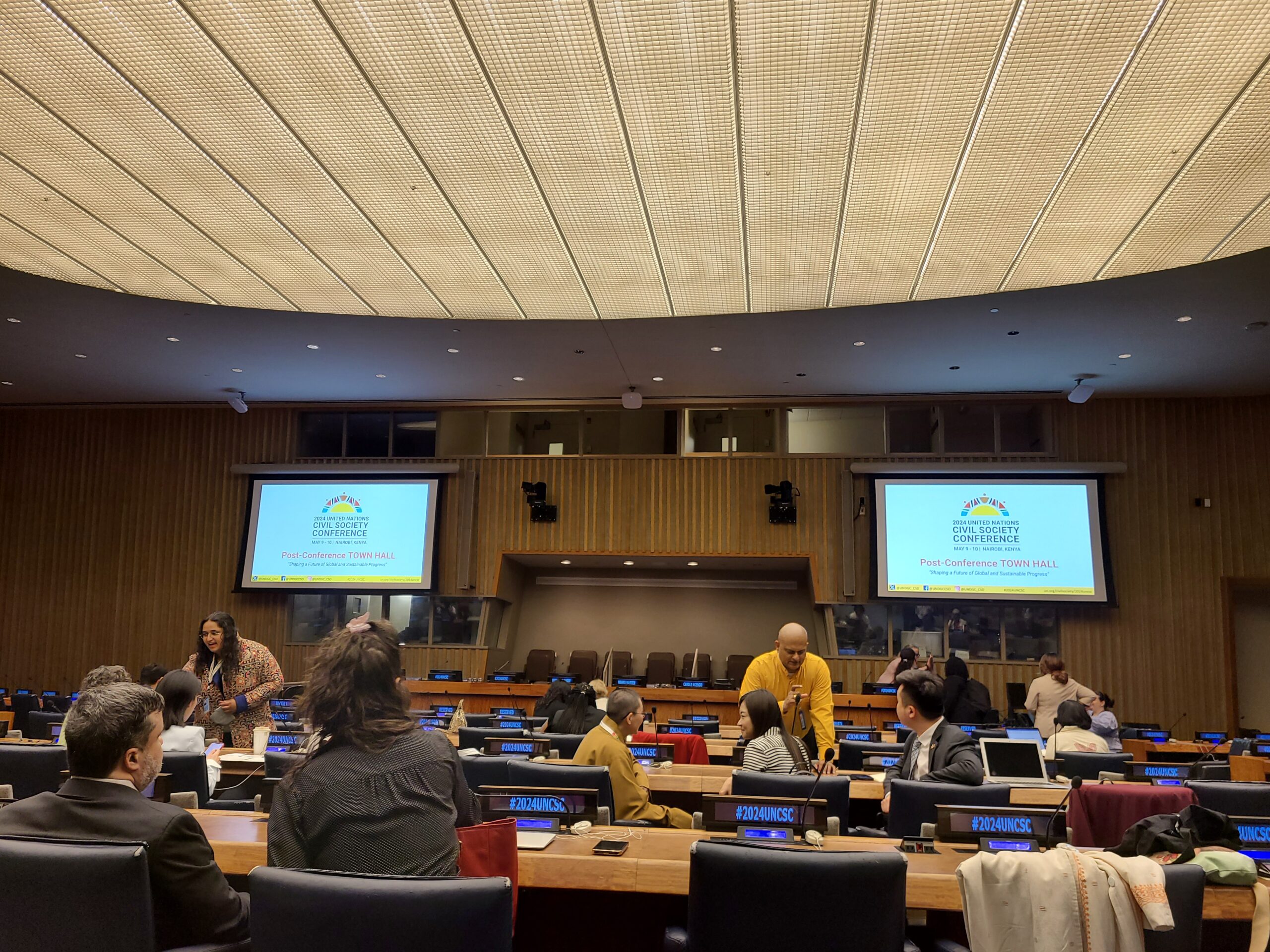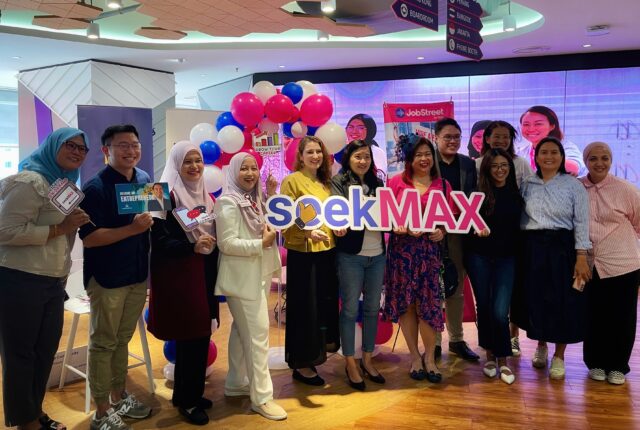Inputs from the 2024 UN Civil Society Conference (UNCSC) “Post Conference” Town Hall
UNCSC Post-Conference Town Hall
The organizing committee for the 2024 UN Civil Society Conference in Nairobi hosted a post-conference Town Hall on May 31, 2024 at the UN Headquarters in New York. The SDG Academy attend the Town Hall in order to better understand the outcomes of the conference from the reflections of organizers, as well as engage in the open question and answer session. Keep reading to discover a summary and additional resources gathered by staff who attended the meeting.
The post-conference Town Hall began with a summary of key findings from self-reported demographic data from participants. There was a qualitative difference in member state engagement in the conference, compared to Salt Lake City conference and other years, and attendance by the UN Secretary General and the President of Kenya reflect that. Conference co-chairs Nudhara Yusuf, Carole Osero-Ageng’o, and Maher Nasser spoke to meaningful national and international outcomes from the conference.
Carole Osero-Ageng’o:
◦ A significant moment for Kenya’s Civil Society ecosystem, President William Ruto enacted a 10 year old piece of legislation called the Public Benefit Organizations (PBO) Act, which speaks to a new chapter of engagement and regulation of CSOs in Kenya
◦ There were positive and negative outcomes from the conference, and moving forward we must leverage our numerical diversity and geographic strengths. Leveling up the Pact for the Future, ensuring it is fit for the current young people and the future. First step toward doing that was bringing the conference to the Global South.
Nudhara Yusuf:
1. There were two key outcomes from the conference. Part A: Not a negotiated text, but an outcomes package that has the co-chair summary and two bullet points under each of the workshops, stats etc. Part B: imPACT coalitions whose principle criteria is “self organized”, they will determine their next steps. Timelines vary among the coalitions, some of them might focus on the Pact for the Future, others have longer timelines.
2. Renewed confidence that UN member states want to see change from SOTF, but they need support to go in know what reforms they should seek. Onus is on civil society to reach out to member states we think will support our proposals
Reflections from Subcommittee Chairs:
- Dr. Eunhee Jung, the Workshop sub-committee co-chair, oversaw workshops conducted both online and in person. They received 232 applications and selected only 54. The workshops addressed key commitments and recommendations, which were listed and summarized. Find those summaries on page 18 the UNCSC Outcomes Package here.
- Arc. Lola Ibrahim from the Exhibits committee highlighted the impact of inclusive and innovative exhibits. Out of 68 applications, 38% were co-organized, with 50% coming from Africa. The exhibits emphasized the importance of relationships, with 81% focusing on health. They were well-received by various communities, including the LGBTQ community.
- Program committee co-chairs Oli Henman, Brenda Mofya, Marianne Haslegrave aimed to build on UN Major Group support. This time, Department of Global Communications and ECOSOC accredited organizations were invited, which hasn’t always been the case. More than 50 speakers were nominated, with only a few selected. Co-facilitators from the Summit for the Future engaged participants and linked impact coalitions to the plenary.
- The offsite events subcommittee, led by Rosario del Pilar Diaz Garavito, organized over 60 events globally, with more than half being in person and 32% online. These events, including local, regional, and national ones, involved children in over 50% of cases. Events took place from February to May, with outcomes beginning on page 18 the UNCSC Outcomes Package here.
- Terry Otieno, Cairo Eubanks, Mai Sami Ahmed, Kristin Bodiford, from the Intergenerational and Youth subcommittee, organized two major briefings, a hub, and a mural, which generated significant interest and engagement. Melissa Fleming’s LinkedIn page highlighted the work. The PM of Netherlands and SDG Action led a group of 200+ youth before and after the conference, with funding provided for youth to attend the conference.
- Ishaan Shah, from the Experts subcommittee, addressed concerns about impact coalitions potentially overriding existing structures within the UN. Thus far, 18 out of 20 imPACT coalitions have submitted plans.
- Yande Banda, from the Media sub-committee, launched several assets and toolkits, including an Instagram live session with conference co-chair Maher Nasser, a global mosaic, and the #wecommit campaign. Real-time updates via X were provided by over 20 staff members. Youth reporters conducted interviews with high-level attendees on site, and a fabulous media moment was orchestrated during the final session.
- Jeffrey Huffines, from the Fundraising and Budgeting sub-committee, emphasized the importance of trust and commitment among planning committee members, civil society networks, constituencies, the UN, governments, and donors. He highlighted the promise and hope of the Summit of the Future and its outcomes.
- Renata Juliotti, from the accessibility subcommittee, highlighted the committee’s work to address over 30 requests for special needs, ensuring they were met, including wheelchairs, visual, hearing, and cognitive aids, as well as nursing parent support. Prior to the conference, training workshops were conducted to educate volunteers on meeting participants’ needs.
- The Outreach sub-committee, with regional sub-committees, supported local outreach in Nairobi and conducted digital Global Action Mosaic. They engaged celebrities and influencers and successfully mapped projects on the Global Action Mosaic. Over 400k individuals were engaged over the last few months. There was an emphasis on educating civil society about the workings of the UN and the role of civil society in effecting change, leading into the Summit of the Future.
Town Hall Q & A
The Town Hall concluded with a question and answer session, the time was used by interest groups and civil society members who identified significant gaps or rescissions of their recommendations in the Pact for the Future. These interest groups included Health Impact Coalition, the Impact Coalition for Faith Based Organizations, Stakeholder Group on Aging. All representatives were encouraged to connect with member states and the Pact for the Future organizing committee to advocate for their recommendations.

Helen Perham
Helen is the Communications Coordinator with the SDG Academy. Helen received her Bachelor’s degree in International Development and Social Change and Studio Art and her Master’s degree in International Development from Clark University. Helen is interested in gender, health, and economic justice. She is passionate about SDG 16 and the incorporation of peace studies and conflict resolution in sustainable development.



